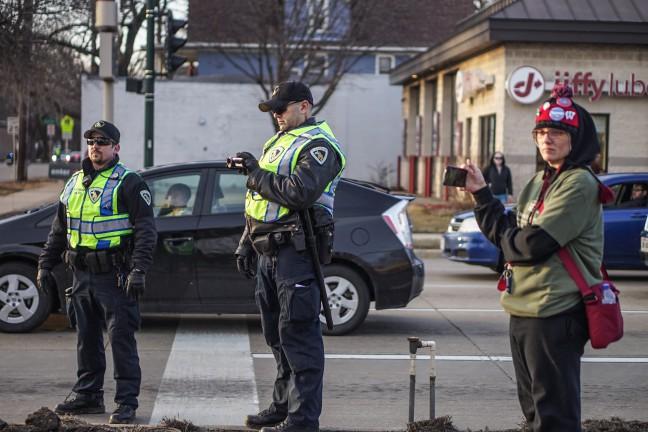Madison’s Common Council pushed back the proposal for the one-year pilot program that gives body-worn cameras within the Madison Police Department and will take up the issue April 19.
If the council moves forward with the resolution, the city would allocate a proposed $83,000 for purchasing 48 body cameras for officers in the north district, WMTV reported.
Alderperson Patrick Heck and Alderperson Charles Myadze said the proposal is being re-referred to the council at a later date because of an ordinance requiring a public hearing process for surveillance technology to be implemented.
The body-warn cameras pilot program proposal comes as part of the Police Body-Worn Camera Feasibility Review Committee’s report that was released last year. Among other recommendations, testing the surveillance technology was listed as a precondition to the full implementation of the cameras.
Heck said the Public Safety Review Committee had other issues with the resolution he felt needed to be addressed.
Madison city council considers implementing pilot program for police worn body cameras
“There needed to be an understanding about how charges would or wouldn’t come out of body-worn cameras and several other important other things that aren’t included in the resolution,” Heck said.
Heck said money was another problem. The council’s estimate for the program’s cost included using the overtime budget for the police department to fund some operating portions of the pilot program. Heck said that because overtime budgets are for emergencies and unexpected expenses, some council members were hesitant.
“There are incidents that require police overtime and so we didn’t feel it was appropriate to use the police overtime budget for something that is a predictable expense,” Heck said.
Many members of the council are divided in their opinions on how the city should move forward with the use of body-worn cameras.
Heck said there are alderpersons who strongly support or oppose the proposal, but one thing he felt everyone agreed on was that body cameras would not solve every issue.
“It’s certainly true that [in the case of] George Floyd and many murders of citizens by police in the last few years that have gathered so much attention — body-worn cameras were deployed and those incidents still took place.” Heck said.
Man arrested for sexual assault in Eagle Heights community released from jail
In response to complaints Madison is taking too long to start using body cameras, Heck said he doesn’t necessarily think that is the case. Heck said he hopes for rigorous studying of the issue and the data from the pilot program before body-worn cameras are put in use for MPD at large.
Alderperson Charles Myadze strongly supports the pilot program and said he disagrees with opposing arguments on funding. Myadze said the benefits of having technology like this out in the community should not be overlooked.
“The costs can’t be considered in a vacuum without considering the benefits and some of those benefits can’t be quantified, like avoiding complaints, lawsuits, settlements and verdicts and the community being able to see what happened in a high profile case,” Myadze said.
In cases like the murder of George Floyd, Myadze felt body cameras were important because of the additional footage they provided. He said in cases where body cameras were not deployed, the public misses important information.
Myadze said the argument that body cameras would further incriminate marginalized communities is a delay tactic. He added that with home cameras and the amount of surveillance equipment on the streets today, citizens are already caught on cameras often.
“Since the death of Tony Robinson, people have been crying out for body cameras,” Myadze said. “[body cameras] could have been something that definitely would have been used as people are crying out for justice still.”
Myadze said key figures — both locally and nationally — have spoken out in support of police-worn body cameras. Myadze said he believes it is important to listen to individuals who have expertise in racial equity and want these programs in place, explaining that public engagement will be beneficial.
Myadze said if the pilot program goes forward and MPD officers wear body cameras, trust will be rebuilt in the community after its been lacking for a long time — especially within the Black community. He added the police department will also gain an additional training tool.
“It’s not a panacea to solve all police conduct, but it’s one of the tools that we can use in conjunction with other police reforms in order to bring trust that the community needs,” Myadze said.
Myadze said he thinks people, especially those working in racial equity, should start watching and attending council meetings as opposed to writing letters.
“I think if my colleagues knew and talked to the people who have been studying this issue for a long time, [the pilot program could] definitely be passed.”













